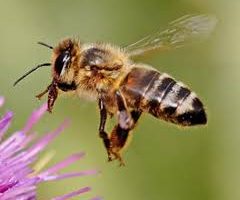
The Connecticut Agricultural Experimental Station have published an article “Protecting Bees from Pesticides” which includes advice to homeowners on insecticide use. Note that some common trademark names of pesticides containing neonicotinoids, which pose a special hazard to pollinators, are: Bayer Advanced 12 Month Tree and Shrub, Bayer Advanced 3 in 1 Insect, Disease, and Mite Concentrate, Bayer Advanced Complete Insect Killer Soil and Turf, Bayer Advanced Lawn Complete Insect Killer, Bayer Advanced Season Long Grub Control, Bonide Duraturf Insect and Grub Control. Fertil-Lome 2-N-1 Systemic, Grubex, Monterey Once and Year Insect Control, Ortho Bug B Gon Year Long Tree and Shurb Insect Control, and Scotts Fertilizer with Grubex.
Obama cares! John Holdren, Director of the White House Office of Science and Technology Policy invited 60 scientists, conservationists and community leaders to discuss the plight of declining pollinators, with particular focus on bees and the monarch butterfly. “This is an issue that President Obama personally cares about,” Holdren told participants.
We know that our bee population has plunged in recent years, with more than 25 percent of the managed honey bee population disappearing since 1990. One big reason for the decline is the skyrocketing use of neonicotinoids such as thiamethoxam and sulfxaflor. While the EPA has admitted these pesticides are “highly toxic” to bees, they are about to rubber stamp requests for their expanded use by the two big chemical companies, Dow and Syngenta. Please halt this proposal and send an urgent message to the EPA right now!
In a new study from the Harvard School of Public Health published on May 9th in the Bulletin of Insectology, Chenshen (Alex) Lu, Associate Professor on Environmental Exposure Biology at HSPH, reports, “We demonstrated again in this study that neonicotinoids are highly likely to be responsible for triggering CCD in honey bee hives that were healthy prior to the arrival of winter”. Read more at this link.
Cross-pollination helps at least 30 percent of the world’s crops and 90 percent of our wild plants to thrive. Without bees to spread seeds, many plants—including food crops—would die off. Here are suggested plantings that will help your garden provide the right habitat for pollinators.
Our Environmental Awareness Committee also encourages you to sign the attached petition asking Lowe’s and Home Depot to stop selling plants and pesticides harmful to bees.


